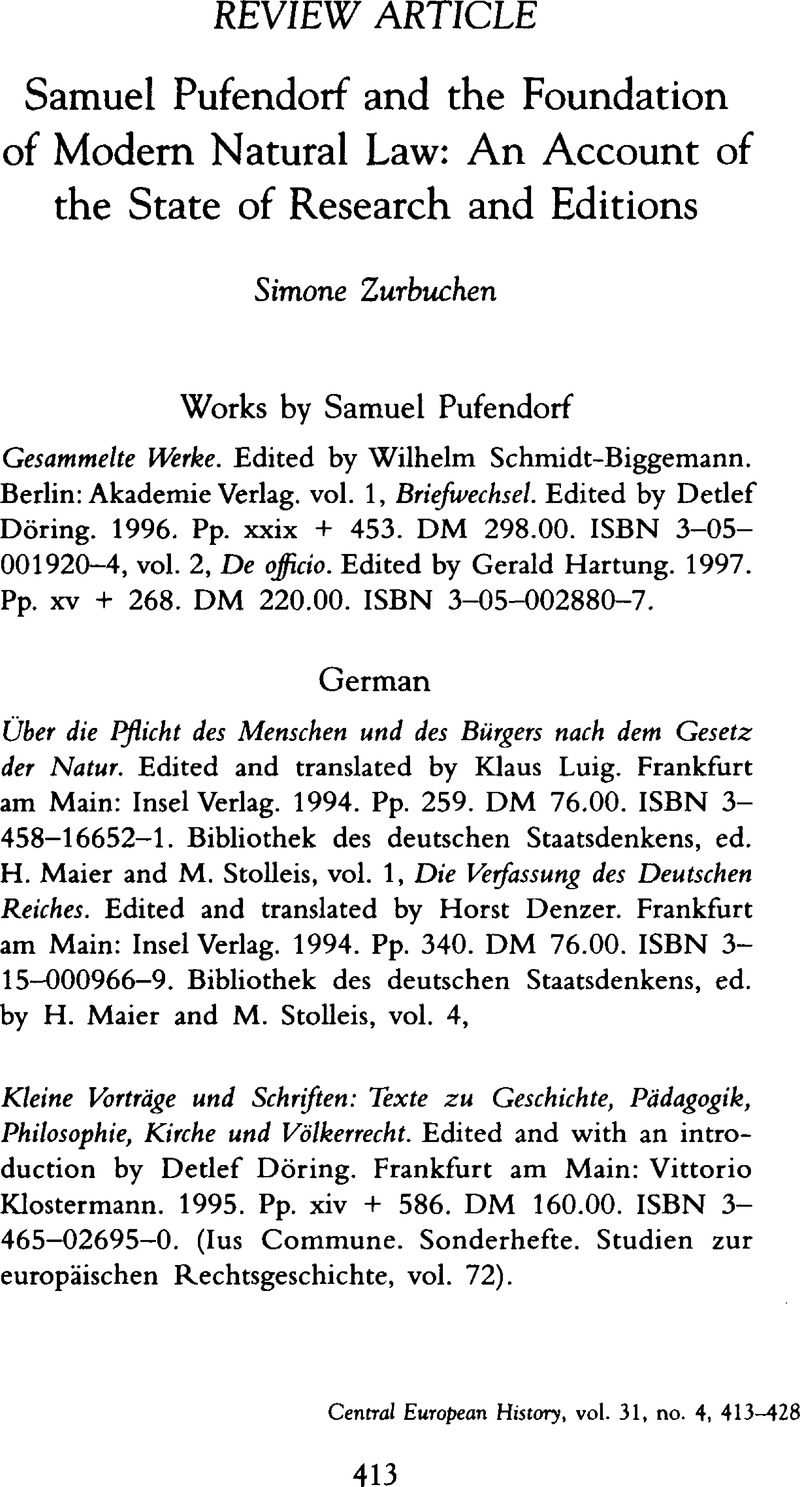Published online by Cambridge University Press: 16 December 2008

1. A summary of this account is now available in Haakonssen, Knud, Natural Law and Moral Philosophy: From Grotius to the Scottish Enlightenment (Cambridge, 1996).CrossRefGoogle Scholar
2. See Larrére, Catherine, L’invention de l’économie au XVIIIe siècle (Paris, 1992).Google Scholar
3. Döring, Detlef, Pufendorf-Studien: Beiträge zur Biographie Samuel von Pufendorfs und zu seiner Entwicklung als Historiker und theologischer Schriftsteller (Berlin, 1992).CrossRefGoogle Scholar
4. Dufour, Alfred, “Pufendorfs föderalistisches Denken und die Staatsräsonlehre,” in Samuel Pufendorf und die Europäische Frühaufklärung, 105.Google Scholar
5. Luig, Klaus, “Nachwort,” in Über die Pflicht des Menschen und des Bürgers, 217.Google Scholar
6. See Mautner, Thomas, “Carmichael and Barbeyrac: The Lost Correspondence,” in Samuel Pufendorf und die europäische Frühaufklärung, 190–208.Google Scholar
7. de Vet, J. J. V. M., “Some Periodicals of the United Provinces on Pufendorf: Reconnoitering the Reception of his Ideas in the Seventeenth and Eighteenth Centuries,” in Samuel Pufendorf und die europäische Frühaufklärung, 209–35.Google Scholar
8. Dufour, Alfred, “Pufendorfs föderalistisches Denken, 105–22. Same in French: “Federalisme et raison d’état dans la pensée politique pufendorfienne,” in Samuel Pufendorf filosofo del diritto e della politica, 107–273.Google Scholar
9. Moore, James and Silverthorne, Michael, “Protestant Theologies, Limited Sovereignties: Natural Law and Conditions of Union in the German Empire, the Netherlands and Great Britain, in A Union for Empire: Political Thought and the British Union of 1707, ed. Robertson, John, (Cambridge, 1995), 171–97.Google Scholar
10. See especially Döring, Detlef, “Säkularisierung und Moraltheologie bei Samuel von Pufendorf,” Zeitschrift für Theologie und Kirche 2 (1993): 156–74.Google Scholar“Untersuchungen zur Entwicklung der theologischen und religionspolitischen Vorstellungen Samuel von Pufendorfs,” in Religion und Religiosität im Zeitalter des Barock, ed. Breuer, Dieter, part 2, (Wiesbaden, 1995), 873–82.Google Scholar
11. Moore, /Silverthorne, , “Protestant Theologies,” 180.Google Scholar
12. Ibid., 182.
13. Pufendorf, Samuel, Die Verfassung des Deutschen Reiches, ed. Horst Denzer, 20–23.Google Scholar
14. Ibid., 51.
15. Ibid., 119.
16. Döring, Detlef, “Untersuchungen zur Entwicklungsgeschichte der Reichsverfassungsschrift Samuel Pufendorfs (Severinus de Monzambano),” Der Staat 33, no. 2 (1994): 185–206.Google Scholar
17. Grunert, Frank, “Zur aufgeklärten Kritik am theokratischen Absolutismus: Der Streit zwischen Hector Gottfried Masius und Christian Thomasius über Ursprung und Begründung der summa potestas,” in Christian Thomasius: Neue Forschungen im Kontext der Frühaufklärung, ed. Vollhardt, Friedrich (Tübingen, 1997).Google Scholar
18. Bazzoli, Maurizio, “La concezione pufendorfiana della politica internazionale,” in Samuel Pufendorf filosofo del diritto e della politica, 29–72.Google Scholar
19. See Zurbuchen, Simone, “Samuel Pufendorf’s Concept of Toleration,” in Difference & Dissent: Theories of Tolerance in Medieval and Early Modern History, ed. Nederman, Cary J. and Laursen, John Christian (Lanham, 1996), 163–84.Google Scholar
20. Döring, Detlef, “Samuel Pufendorf and Toleration,” in Beyond the Persecuting Society: Religious Toleration before the Enlightenment, ed. Laursen, John Christian and Nederman, Cary J. (Philadelphia, 1998), 178.Google Scholar
21. Dreitzel, Horst, “Toleranz und Gewissensfreiheit im konfessionellen Zeitalter: Zur Diskussion im Reich zwischen Augsburger Religionsfrieden und Aufklärung,” in Religion und Religiosität im Zeitalter des Barock, ed. Breuer, Dieter, part 1, (Wiesbaden, 1995), 115–28.Google Scholar
22. Dreitzel, Horst, “Gewissensfreiheit und soziale Ordnung: Religionstoleranz als Problem der politischen Theorie am Ausgang des 17. Jahrhunderts,” Politische Vierteljahresschrift 36, no. 1 (1995): 3–36.Google Scholar
23. Ibid., 91.
24. Ibid., 93.
25. Quoted by Seidler, 97.
26. Vanda Fiorillo, Tra egoismo e socialità, 49.
27. Hont, Istvan, “The Language of Sociability and Commerce: Samuel Pufendorf and the Theoretical Foundations of the ‘Four-Stages Theory,’” in The Languages of Political Theory in Early-Modern Europe, ed. Pagden, Anthony (Cambridge, 1987), 253–76.CrossRefGoogle Scholar
28. Kari Saastamoinen, The Morality of the Fallen Man, 39.
29. Ibid., 67.
30. Ibid., 86.
31. J. Schneewind, “Barbeyrac and Leibniz on Pufendorf,” in Samuel Pufendorf und die europäische Frühaufklärung, 181–89.
32. Simone Goyard-Fabre, “Pufendorf et Grotius: deux faux amis ou la bifurcation philosophique des théories du droit naturel,” in Samuel Pufendorf filosofo del diritto e della politica, 171–207. See also her Pufendorf et le droit naturel (Paris, 1994).Google Scholar
33. Schneewind, “Barbeyrac and Leibniz,” 188–89.